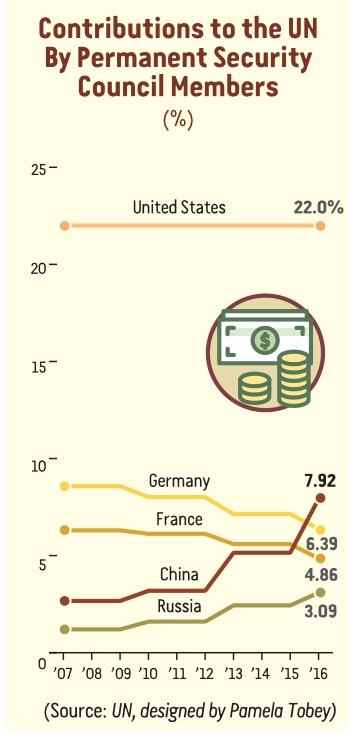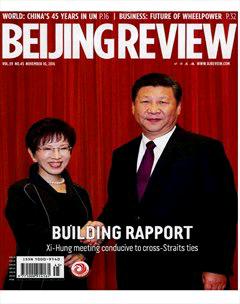A Responsible Player
By Jia Lieying


Forty-five years ago on October 25, the UN General Assembly passed Resolution 2758, initiated by Albania, to recognize the Peoples Republic of China (PRC) as the sole legal China. The resolution, by acknowledging Chinas representation, its sovereignty, and its rights, underpins the UNs legitimacy as a full representation of the international community.
As the most universal, representative and authoritative inter-governmental organization, the UN plays an indispensable role in international affairs. China, under the rule of the Kuomintang back in the early 1940s, was a founding member of the UN and is one of its five permanent Security Council members.
However, Chinas seat in the UN was a focus of international struggle since the establishment of the PRC in 1949. That year, the Kuomintang regime fled the mainland for the island of Taiwan after losing a civil war to the Communist Party of China. Amid the Cold War and Korean War, with support from the United States and its allies, the Taiwan authorities had claimed Chinas UN seat until 1971.
Revival through reform
This year marks the 45th anniversary of the restoration of the lawful seat of the PRC in the UN. Over this period, China has been rising as a responsible player in international affairs. Meanwhile, self-improvement in the UN is vital to meet the challenges of an ever-changing world. It is important to understand the past in order to look into contemporary and future China-UN relations.
The UN was founded from the ashes of World War II (WWII) in October 1945. The Allied Nations had fought hard against the Axis Powers, making enormous sacrifices until peace finally came. This historical record must be taken into account when any reform is proposed.
Currently, the UN is made up of 193 member states. It is important to note that the UN is not a world government. Instead, it is an international organization that acts between sovereign states. Thus, its resolutions and activities must be made on the basis of member state consultation and consensus. The UN abides by the principle of non-intervention, which “prohibits the use of force against the territorial integrity or political independence of any state,”though exceptions such as acts of self-defense are listed in the UN Charter. On the other hand, the UN must fulfill its obligations to maintain peace and security as well as promoting sustainable development.
The world has comprehensively changed since the body was founded 71 years ago. Contemporary issues and crises worldwide require a more representative and effective UN. Therefore, carrying out institutional reform is more necessary than ever. In fact, the UN Charter has been amended five times since 1945. The General Assembly has embraced greater power and the Secretariat has been much improved. The success in adjusting the contributions made by member states to the UN helped the organization sail through a funding crisis in the past.
At the present stage, it remains difficult to make a substantial breakthrough in reforming the UN Security Council (UNSC). The reform calls from many member states center on the veto privilege exclusively enjoyed by the five permanent members—the United States, Russia, the United Kingdom, France and China. From the very beginning, the veto power has caused controversy. However, it reflected the reality of international politics and helped maintain balance between the United States and the former Soviet Union, the two Cold War superpowers.
Since the end of the Cold War, Security Council reform, focusing on veto power and the number of members, has fueled fierce arguments among members. Germany and Japan, two nations defeated in WWII, have risen again as economic superpowers and desire more influence in the Security Council. Meanwhile, emerging countries such as India and Brazil want more representation to reflect their growing status.
Consequently, at the 59th Session of the General Assembly in 2004, the G4 nations, namely Germany, Japan, India and Brazil, expressed their desires to become permanent members in an expanded Security Council. Three permanent members—the United States, Russia and China—objected to the proposal, resulting in failure for the G4. Any reform to the Security Council requires the consent of at least two-thirds of UN member states, and, crucially, that of all UNSC permanent members, according to Article 108 of the UN Charter.
Three of the five UN Charter amendments focused on expanding the number of nonpermanent members to the UNSC and the number of members to the Economic and Social Council. However, enlarging the UNSC, in particular by increasing members with the right to veto, would be a significant structural adjustment to the UN. Thus, it is reasonable that the five permanent members of the UNSC are cautious and prudent toward such a proposal by the G4.
The Chinese Government is always ready to support potential reforms to the UNSC. China believes that any possible UNSC reform should first accommodate the propositions and concerns of developing countries, especially in Africa. China favors the adoption of a comprehensive reform package based on democratic and thorough consultations and the most broadly based consensus. This should serve the purpose of making the UN more representative, authoritative and effective.
Growing contribution
The UNs recognition of the PRC as the sole legal China shows that the UN is an organization of sovereign states. It also helps the international community to understand that Taiwan is an integral part of China. By increasing its participation in international affairs within the UN framework, China has been deepening its ties with the rest of the world.
Before 1971, 64 states had established diplomatic relations with the PRC. After the PRC replaced the Taiwan authorities in representing China at the UN, diplomacy rapidly extended to almost every corner of the world. Currently, the PRC has diplomatic relations with 173 countries. China has joined almost every inter-governmental organization and over 400 international multilateral treaties.
The sound cooperation with UNfacilitated programs enabled China to acquire the capital, technology and experience necessary for its domestic economic takeoff. More importantly, China has become increasingly familiar with international norms and rules and has undoubtedly become one of the biggest beneficiaries of the globalization process.
Meanwhile, China has been making its due contribution to the UN. According to the latest statistics, China has dispatched around 30,000 troops globally on UN peacekeeping missions—the largest number among the five permanent UNSC members since it began participating in 1990—to help maintain peace and stability in conflict areas.
China plays a constructive role in international affairs. It was the first nation to achieve the UN Millennium Development Goal of reducing poverty by 50 percent by 2015. China is also striving to implement the 2030 Agenda for Sustainable Development adopted at the UN General Assembly in September last year. China was in the first group of countries to sign and ratify the Paris agreement adopted by the 196 parties to the United Nations Framework Convention on Climate Change last December. China aims to work with the international community in facing climate change and other global challenges.
At the 70th Session of the General Assembly in 2015, Chinese President Xi Jinping announced the establishment of a$1-billion China-UN fund to support the organizations development and multilateral missions. The Chinese president vowed to offer more humanitarian aid to address refugee crises and called for international efforts to improve global governance and promote a fairer global order.
In a rapidly changing world, the UN is expected to play a more important role in international affairs. Any reform attempt must strengthen, but not weaken the UN; and UN authority must be safeguarded instead of being undermined.
China has become the second largest economy on the planet, with its contribution to global economic growth currently being over 25 percent. More than 700 million people across the country have been lifted out of poverty. China is on course to realize the goal of becoming a moderately prosperous society by 2020.
With growing national strength, China is making a greater contribution to the UNs expenses. At present, it ranks third among all member states in bearing the administrative costs of the UN General Assembly. And China has become the second largest donor to peacekeeping operations. Its relationship with the UN will continue to grow in the foreseeable future. The world also expects China to offer more services to the international community.
On October 6, the UNSC formally approved the nomination of former Portuguese Prime Minister Antonio Guterres to the position of secretary general—the UNs chief administrative officer. China, along with the international community, expects the UN, under the new secretary general, to achieve greater progress in maintaining peace, promote common development, and build shared prosperity that can benefit people from all walks of life.

